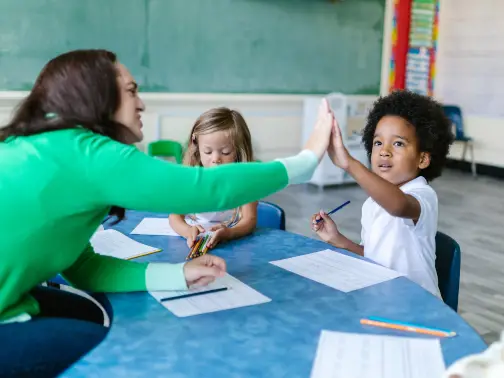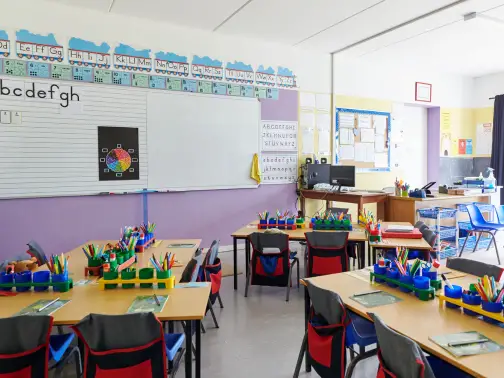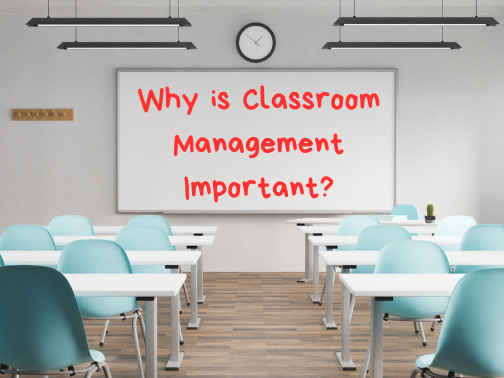Contents
Toggle
Meet David De’ Ath, co-founder, editor, and writer at Wonderful World English. With his extensive background as an English teacher, David provides valuable insights and practical tips on ESL for students and teachers alike.
Any teacher will agree that a well-managed classroom is at the very heart of ensuring a positive learning experience.
A well-managed classroom creates a positive atmosphere where the students feel safe.
It also increases a student’s motivation and willingness to listen and learn.
A poorly managed classroom, on the other hand, can be a nasty experience that drains both teachers and students of joy and the will to live.
Teachers must establish clear expectations, set rules for their students, and do their best to build an environment that promotes academic growth and personal development.
Classroom management is essential as it is crucial in building an effective learning environment. This means students will be more engaged, better behaved, and feel generally safer and more motivated to get involved. It is also very important for the teacher’s well-being and emotional health.
I have several years of teaching experience and have learned many effective strategies along the way.
In this article, I aim to help you better understand the importance of classroom management alongside some useful tips on how to manage a classroom more effectively.
Whether you’re already teaching, or just curious, you’re in the right place.
Let’s jump in!

Why Classroom Management is Important
Classroom management is essentially the process and strategy educators employ to create a harmonious and productive learning environment.
By doing this, the likelihood of disturbances and accidents will be minimized, creating a healthier place for everyone.
Let’s look at some of the major elements of a well-managed classroom:
1. Students Understand What is Expected of Them
Teachers must set clear expectations to help their students understand what is expected of them.
In behavior and progress, a student who is fully clear on how they are expected to perform in class will have much more of an edge than students who are not.
This means teachers should be very clear in their communication, and set rules and instructions that everyone can follow.
This provides a framework for good behavior and helps maintain an effective learning environment.
2. Students are Engaged and Involved
Engaged students are always more motivated and attentive to what they are being taught.
They will be more inclined to participate, contributing to a well-managed classroom.
Teachers should try to get all students involved using different techniques and reward systems.
If a classroom is full of engaged students eager to learn, it will be a much more enjoyable process for both them and the teacher.
It’s common for a classroom to have a difficult student or even a group of them.
This can be quite a difficult obstacle for teachers to overcome.
If you’re wondering how you can engage difficult students, you’re in luck!
We detail this and provide valuable tips and insights in the guide below.
Related Article: How to Engage Difficult Students – Teacher’s Guide
3. Students are Well-Behaved
This one cannot be overstated.
There is little worse than a classroom full of naughty students who can’t stop making noise and creating distractions.
It can be incredibly frustrating and massively impacts the learning environment.
This ties into number one, setting clear expectations.
A teacher must lay the law and let the students understand who is the authority in the classroom.
By rewarding good behavior and properly dealing with those who misbehave, a well-managed classroom will be forged.

Now, we understand the components that cause a classroom to be considered well-managed.
Let’s look at some of the major reasons why it is crucial for a teacher to manage their classrooms well:
4. Build a Positive Classroom Culture
The whole purpose of teaching is to help students better understand the world as they grow and develop.
It’s very important for teachers to do their best to create an optimal learning environment where they can get the most out of their students.
As mentioned above, a teacher needs to establish clear expectations, promote student engagement, and encourage good behavior.
By doing these three things, a class will be considered well-managed, meaning everyone will benefit from it.
If a teacher doesn’t do one of these things, it could lead to a disruptive experience that no one will want to be a part of.
Some teachers struggle with classroom management, and it can cause an array of problems both mentally and physically.
By creating a positive classroom culture in a well-managed classroom, a teacher can reap the positive benefits of such an experience instead of hating their job and wishing they’d chosen a different career!
Check out our guide below on how to build a positive classroom environment for some great tips and advice:
Related Article: How to Build a Positive Classroom Culture – Teacher’s Tips
5. Enhance Teaching and Learning Experience
Another huge factor supporting classroom management’s importance is its effect on everyone in the room.
In a well-managed classroom, teachers can focus their energy on delivering high-quality lessons while students can remain focused and engaged.
Teachers need to minimize any distractions and disruptions.
This can be done by creating an organized environment with well-arranged desks, having lots of visual cues, and ensuring the classroom has the necessary materials.
Classroom management is also important to ensure good collaboration and communication among students.
Teachers can incorporate group work and learning activities/projects that require students to work together and use problem-solving skills.
Another important factor of effective classroom management is a teacher taking into account the diverse abilities of their students.
Teachers should be able to change their style to suit different students and their levels.
This ensures that each student receives appropriate challenges and opportunities for growth, leading to greater progress in and out of the classroom.

6. Improve Students’ Chances for Success
One of the primary goals of classroom management is to enhance student achievement.
A well-managed classroom provides the necessary conditions for students to thrive academically and reach their full potential.
By establishing clear routines and procedures in the classroom, a teacher will spend less time dealing with disruptions and be able to devote more time to delivering engaging lessons.
In a well-managed classroom, a student can feel more confident and motivated to get involved.
This will, in turn, boost their chances of success as they will be more likely to take risks and overcome their obstacles.
Teachers can help their students develop a growth mindset, aiding them to grow as individuals and allowing them to garner a love for learning.
7. Help Students Develop
Another huge plus that comes from a well-managed classroom is its impact on the students’ lives outside of the classroom.
It’s great for a student to achieve academically, but when they take what they learn from the classroom and apply it to become better people in their daily lives, that’s a huge bonus.
Developing life skills will help students for the rest of their lives!
A well-managed classroom will provide students with the right tools to develop their social and emotional skills, contributing to a better society.
Ever heard of the three C’s of classroom management?
Learn about these in the link below!
Related Article: What Are the Three C’s of Classroom Management?

8. Tips on Classroom Management
Now, we know some of the major reasons why classroom management is so important.
Let’s take a closer look at some effective strategies that teachers can implement to ensure that their classes are well-managed:
– Promote a Supportive Classroom
One great way to ensure good classroom management is for teachers to provide enough student support.
This means creating a sense of belonging and inclusivity where all students are welcome.
If students feel unwanted or unheard, they may become disruptive as they yearn for attention and approval.
Simply giving students enough attention and recognizing their efforts will go a long way in fostering a supportive and well-managed classroom.
Simply giving a student a high-five, or a thumbs up when they do something good can have more of a positive impact than people realize.
Another great way to promote inclusivity is to include team-building activities to encourage students to work together.
This will significantly contribute towards a positive learning environment and a well-managed classroom.
– Teach and Encourage Self-Regulation
Another useful tip for effective classroom management is for teachers to help students understand and apply proper social skills.
This means regulating emotions and controlling outbursts.
Some students have a difficult time with this, but with practice and understanding, they can overcome their emotional urges and control themselves.
Teachers should be role models and conduct themselves properly, and this will help show their students how they should behave, which in turn contributes to their development both in and out of the classroom.
Teachers can incorporate activities that promote self-reflection, emotional awareness, and problem-solving skills.
Strategies such as deep breathing and positive self-talk can be great ways to help students better control their emotions.

– Promote Empathy and Respect
A very important aspect of classroom management is having one where students respect one another.
This means emphasizing the values of empathy and respect by encouraging kindness, appreciation, and gratitude.
In doing so, students will feel much more comfortable and confident in the classroom as well as more responsible members of society.
– Manage Unwanted Behavior
Teachers will encounter challenging behaviors in any classroom that disrupt the learning environment.
Whether a student is upset or being silly, there are some effective strategies to help a teacher manage bad behaviors:
Prevention
By implementing preventive strategies, a teacher can minimize the occurrence of unwanted behaviors.
Preventive measures include setting clear expectations and establishing a predictable routine.
Positive reinforcement is another very effective strategy to help prevent challenging behavior.
This means rewarding students who perform well, with the intention of lesser-behaved students imitating the same behavior in order to get rewarded as well.
Intervention
When unwanted behaviors occur, teachers need to respond promptly and adequately.
This means employing strategies such as active listening and problem-solving discussions to understand the situation and help students reflect on what caused their misbehavior.
This will give the students an understanding of what they did wrong and why they shouldn’t do it.
Individualized behavior plans can be very effective in helping students and behavior management.
Some students may even require extra support, such as counseling.
Using a supportive approach is recommended, which will help students develop desirable behaviors moving forward.
The aggressive approach is not recommended because it will just create a negative atmosphere where students are too frightened to get involved and learn.
This doesn’t mean teachers shouldn’t assert themselves.
I find a firm but fair approach suits me best.
I don’t tolerate bad behavior, and I will always reward students who try their best.
This has helped me teach in countless well-managed classrooms with great atmospheres.

– Collaborate with Parents and Guardians
Effective classroom management extends beyond the classroom walls.
By building strong partnerships with parents and guardians, teachers can help ensure that their students are applying what they’ve covered in the classroom at home as well.
It is wise to have an open and consistent line of communication with students’ parents.
This will promote a shared understanding of the student’s progress, challenges, and goals.
There are many ways a teacher can do this, such as via phone calls, messaging apps, or parent-teacher conferences.
In doing this, parents can also provide teachers with valuable insights into the student’s strengths, interests, and concerns.
This approach strengthens the support system and contributes towards a well-managed classroom.
Involving families in the learning process and creating opportunities for family participation, such as school events and projects, can contribute greatly to a student’s progress.

9. The Role of the Teacher
A well-managed classroom relies on the skills and know-how of the teacher.
As educators, a teacher plays a critical role in creating and maintaining an optimal environment for learning.
Let’s take a closer look at what is required of a teacher to manage a classroom effectively:
– Effective Instructional Strategies
There are a variety of instructional strategies that teachers should employ.
Including interactive and engaging teaching material, incorporating technology and media, and providing personal experience can all contribute to capturing students’ interest.
Differentiation strategies like tiered assignments and flexible grouping can allow teachers to assess and address each student’s unique strengths and requirements.
A teacher who can adapt their teaching style and implement different strategies will be able to maximize student engagement and contribute to a well-managed classroom.
It can take some experimentation, but teachers should not be afraid to try new things and see what works.
It’s all part of the development of the teacher, too!
– Classroom Organization and Design
A teacher must ensure the classroom is well organized to maximize effective classroom management.
A disorderly and unattractive-looking classroom will breed a less positive atmosphere and may contribute to less student engagement.
The physical layout should help promote student interaction accessibility to resources, and ensure they feel safe and comfortable.
This means strategically arranging desks and furniture, organizing materials, and creating designated spaces for different activities.
Keeping the walls visually stimulating with lots of colorful posters and art is also a great idea.
Many teachers like to showcase their student’s work on the wall, which can effectively boost student engagement and motivation.

– Reflective Practice and Professional Development
Effective classroom management requires ongoing reflection and professional development from teachers.
This means continually assessing practices, seeking feedback from colleagues, and seeking professional learning opportunities to enhance their skills.
By reflecting on their classroom management strategies, teachers will be able to identify the areas that need improvement and explore new techniques to improve the quality of teaching and engagement of the students.
Workshops, conferences, and collaboration with other teachers can all provide valuable insights and support for anyone wanting to improve their classroom management skills.
Do you know a teacher struggling with classroom management?
Find out how you can help them in the guide below!
Related Article: How to Help a Teacher with Poor Classroom Management
– Build Relationships and Rapport
Another important role of a teacher is to establish positive relationships with their students.
Having a good rapport with students is a massive help in classroom management.
By making students feel valued and respected, and treating them like people, they will begin to establish stronger connections with their teacher.
By getting to know their students individually and showing an interest in their lives, teachers will be well on their way to building a strong rapport with their class.
Teachers can also include community-building activities, such as icebreakers, team-building exercises, and class celebrations, to promote a positive atmosphere and a well-managed classroom.
– Self-care and Well-Being
Another crucial role of a teacher is to make sure they look after themselves!
They must take the time to relax and maintain their effectiveness in the classroom.
Teaching can be a demanding and stressful job, and if a teacher doesn’t take time for their own mental, physical, and emotional health, it won’t do their quality of life any favors.
Practicing mindfulness and relaxation techniques can be very effective in helping teachers relax.
Seeking support from colleagues is another great way for a teacher to ensure their own well-being.
By taking care of themselves, teachers can model healthy habits for their students and ensure a well-managed classroom with energy and enthusiasm.
Check out this article to learn 21 ways stressed-out teachers can relax.

Conclusion
In conclusion, a well-managed classroom ensures a positive learning environment.
It lays the foundation for effective teaching and learning to be done.
A well-managed classroom will allow students to be engaged and motivated to learn and ensure teachers are not overwhelmed by unwanted behaviors.
Promoting healthy behaviors, having an organized classroom, and maintaining good communication with students and parents can all positively impact how well a classroom is managed.
Educators must understand the importance of classroom management and continually refine their practices to create the best environment for them and their students..
By embracing the art of classroom management, we empower ourselves to create an environment where every student can thrive and reach their full potential.
We hope this helps you better understand the importance of classroom management and how it can be achieved.
Image Attribution: All images licensed via canva.com





